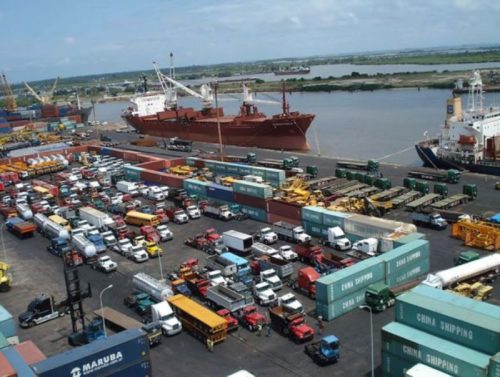
Stakeholders and operators in the maritime sector have expressed worry over the state of the country’s maritime industry, a situation they blame on lack of adequate attention by the government and poor leadership.
The stakeholders who made the submission at the second transport leadership lecture with the theme ‘Leadership in the Next Level Democracy: Striking a Positive Balance in Transport Sector’, organized by Kings Communications Limited, decried the huge infrastructural deficit in the industry especially in the transport sector.
Chairman, Seaport Terminal Operators Association of Nigeria (STOAN), Princess Vicky Haastrup, blamed bad leadership of past and present government for the ills plaguing the sector, stating that despite huge revenue generated by the industry annually; it is not getting the needed attention from the government.
Lamenting how the deplorable port access roads and Apapa gridlock, which she described as a national disgrace is affecting operations at the port, Haastrup said, it now takes longer time for vessels to discharge at the expense of the terminal operators.
“It is unfortunate that the maritime industry is what is it is now. It brings me to tears when I see happenings in the sector. Federal Government is busy talking about generating revenue but they are not paying attention to where they can generate the revenue. I want to put the blame on government. The problem of this country is poor leadership. If we have right leadership, right policies will apply to every sector of the Nigerian economy.
“We are talking about optimising digitalization and connectivity in transport sector, do we have it in Nigeria? No we don’t. Look at what Apapa and Tin Can Island has become over the years, shouldn’t we be crying as a nation? It is such a shame, a national disgrace to the federal government that access to the port have been abandoned for so long. I am not blaming this government but they are also part of it because they could have look for solution in four years.
“The governments generate billions through the Customs Service on a yearly basis and yet that is not sending message to the government that this is a sector they need to pay attention to. My company is suffering because the enabling environment is not just there. We run ten berths, but in a month, I could hardly do two shifts in a terminal of ten berths. The Port and Harbours bill, the Transport Commission bill they killed. When we took over in 2006, they told us that the Ports and Harbours bill will be passed within a year, but 14 years after, it is yet to be passed,” she said.
The Executive Secretary of Nigerian Shippers ‘Council, Hassan Bello, however noted that the challenges and infrastructural deficit in the transport sector are not insurmountable, but should be seen as opportunities that investors can leverage on to create jobs and wealth in the nation’s economy.
He stated that for Nigeria to surmount the challenges inherent in the transportation sector, both public and private sector investors need to put in close to N3 trillion in bridging the infrastructural deficit.
According to him, Nigeria needs to make consistent investment of not less than N100 billion per annum till the next 30 year in order to make up for the infrastructural deficit in the country.
He said the recently signed African Continental Free Trade Agreement (AfCFTA) could be the spur that Nigerian transport sector vis-à-vis the port industry needs to grow, going by the near N2 trillion economy, 1.2 billion population as well as 54 countries, which the agreement presents to member countries like Nigeria.
“Nigeria is already a hub but leadership is extremely important to having fair competition. We have already started winning the war because we are now getting cargoes from our competitors. Of course, we have the problem of interconnectivity, which is being solved now; at least, the chaos in Apapa has reduced drastically.
“We believe that by the time the infrastructure problems around Apapa are mitigated, we will see a resemblance of order but we are already having short, medium and long term solutions. Though, there are challenges but we are sure that they will be dealt with. And by August, the Council will sign the $500 million Ibadan Dry Port facility. We are seeing efficiency in our ports but we need to reform our trucking and cargo clearing system,” he said.
“We have a lot of challenges but they are not insurmountable because when I look at the deficit in infrastructure as it is said, we need N3 trillion to make up for our deficit, meaning that we need to spend about N100 billion every year till the next 30 years. We should not be down cast by the challenges but be rejuvenated by the opportunities presented by the infrastructure deficit.
“The African Continental Free Trade Agreement could be the spur that we need because we are talking about the N2 trillion economy and 1.2 billion population as well 54 countries. We need to have imperial output to these negotiations,” he said.
Former Director, Nigerian Maritime Administration and Safety Agency (NIMASA) and guest lecturer at the event, Ufom Usoro, said having an integrated transportation policy is the only way to achieving an efficient transportation system in the country.
She urged government agencies not to work in silos but to synergise with government to achieve the set target of a desirable transport system.
“Some countries, like Nigeria though they have not yet published their integrated transport policy are on the way to doing it, which will provide a road map for managing all these mode of transport towards a specified target,” she said.